The activist entrepreneurs running zero-waste shops
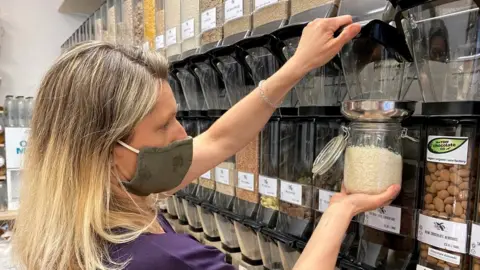 BBC
BBCIn 2017, National Trust colleagues Stacey Fordham, 43, and Lidia Rueda Losada, 37, had a casual chat about how they wished everything they bought wasn't packaged in so much plastic.
The conversation spurred an idea to open a shop selling food and household items entirely without packaging, and in March 2018 they took the plunge.
They opened Zero Green, believed to be the second store in the country and first in Bristol.
Zero Green sells more than 1,000 product lines: including pasta, grains and pulses in dispensers; frozen vegan pasties; eco-cleaning products; cosmetics and sustainable non-plastic toiletries.
Consumers are encouraged to bring their own containers or use recycled jars and packaging to take their shopping home.
"We put in just over £30,000 to start from our own savings," says Ms Fordham, who also previously worked for Sainsbury's.
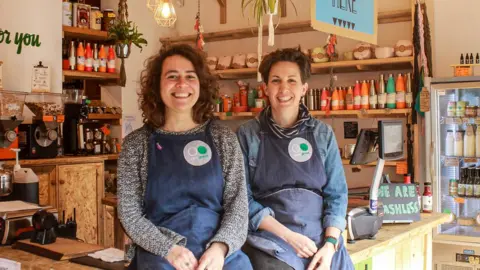 Zero Green
Zero Green"You have to really believe in what you're doing in order to do this, otherwise it's very hard."
The UK's first organic zero-waste shop was Earth.Food.Love in Totnes, set up by former Manchester United footballer Richard Eckersley and his wife Nicola in 2017.
The pioneering couple are credited by the zero-waste community with sharing how they established their business, offering full supplier lists, business plans and pricing lists for free, online.
Ms Fordham and Ms Rueda Losada used their tips. But there was a lot of trial and error, they say, plus additional challenges as they were determined to live by their green principles.
"It was really important for us to not buy virgin wood or racking off a shelf - everything we used in the shop was upcycled.
"We went to electrical companies and got big cable drums, upcycled pallets and salvaged scaffolding boards," says Ms Fordham.
They were "really lucky", she adds, as within six months Zero Green had broken even and eventually moved to a retail space four times bigger.
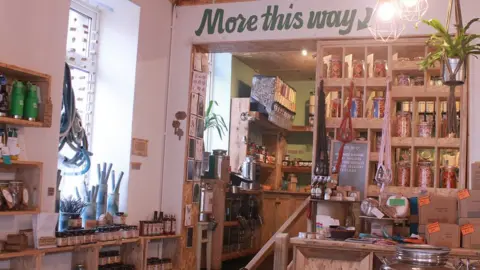 Zero Green
Zero Green"The popularity of it all was more than we expected... demand was so high we physically couldn't fit people into the shop."
Before the pandemic, the store was taking in £12,000 a week in sales, but now revenues have fallen by two thirds and they have had to lay off half their staff.
Making a difference
The online community of zero-waste shop owners estimates there are now roughly 320 zero-waste shops in the UK, but this also includes community interest companies (CICs) and organic wholefood shops.
According to consumer expert Kate Hardcastle, it is difficult to collect official data because many shops go bust and fail. However, the community is growing steadily online and free advice is given to new entrepreneurs on a popular Facebook group.
Vita Viskackaite, 43, opened the Art of Zero Living store in Greenwich, London, in April.
She left a successful career in logistics with restaurant chain Itsu to run the shop, while her partner Justas pays the bills with his earnings. They have invested £55,000 from savings.
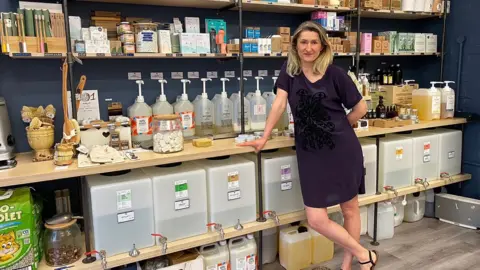
"Two years ago, I read a book called Zero Waste Home by Bea Johnson and it captured me, as it wasn't just about saving the environment - it was also about saving money and improving your life," she says.
Inspired, Ms Viskackaite got rid of 30% of everything she owned and began shopping at a zero-waste shop in north London, but she had to take two buses each way to do her weekly shopping.
"Then coronavirus came and I was very sad because I didn't have anyone locally to buy from," she says.
"So, my husband said to me, 'If you feel so strongly about this, why don't you open your own shop?'"
In June, the couple made £10,000 in sales. After paying £9,000 in overheads including stock and rent, they have a £1,000 profit.
"I hope that one day, there will be many more people who join the zero-waste lifestyle and avoid buying products using single-use plastic just because it's convenient," stresses Ms Viskackaite.
"We were never planning to become rich out of this, we just wanted to have peace of mind."
Societal shift
Research from environmental consultancy, Eunomia, shows mean annual turnover for EU zero-waste shops is around €170,000 (£144,000) based on a sample size of 268 packaging-free shops in 10 EU countries. And there is evidence shop turnover has increased over the past three years.
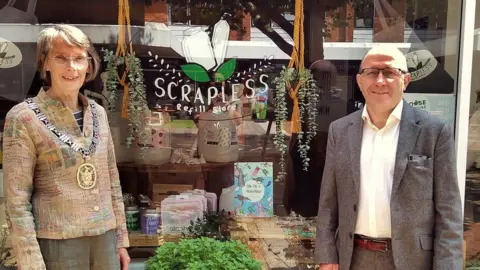 Jasmine Patel
Jasmine Patel"Covid has jolted social consciousness, a retailer told me," says Ms Hardcastle. "In our survey of 140 people, 85% of people said they care more about the environment than they did 12 months ago."
In Sussex, Burgess Hill mayor Anne Eves and council leader Robert Eggleston say there is definitely a movement to rejuvenate high streets with green businesses, like zero-waste shops and eco-fashion retailers.
Since being elected in 2019, they have negotiated rent reductions with commercial landlords and divided up large empty retail units. Start-ups pay lower rents and some avoid business rates altogether.
"We want to nurture these businesses. At some point they will spread their wings and fly, and we want to support them so they have a chance," says Mr Eggleston.
Ms Eves, a Green councillor, says sustainability matters a lot to her constituents. She set up a monthly repair cafe to help people fix their electronic gadgets, clothes and bedding that has been very popular, and thinks every High Street should have one.
"We are gradually changing things... we'd like to see this town thriving as it was 20 years ago."
'Trust in your community'
Architecture graduate Lydia Wilson, 26, started Waste Not Want Not in Bridport, Dorset, three years ago.
"I wanted something which enabled people to live waste-free but also [to] start a conversation on a much wider scale on ethics and organic living," she says.
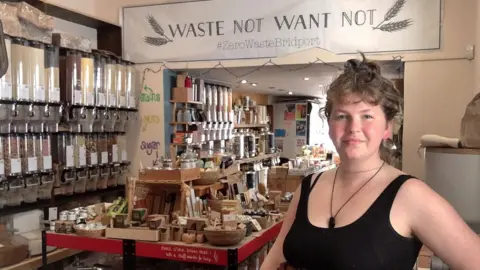 Waste Not Want Not
Waste Not Want NotMs Wilson took out £45,000 in personal loans to start her business. She offers more than 700 products and her biggest customer base is in the 35-50s age group.
It took 18 months for her to break even. Prior to Covid she took £12,000 a year in salary, but now everything is being ploughed back into the store.
She says the journey has been really hard, running the business all by herself, and is thankful that her customers have rallied round.
"I know now that I've got a community of people who really want the shop to be here, and would do what they could to make sure the shop stays.
"That's something I might call upon - it's a limited company but I want to transition it into a community benefit society or a co-operative."
Ms Fordham and Ms Viskackaite both agree that their communities are crucial.
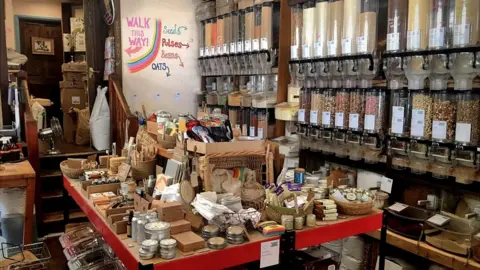 Waste Not Want Not
Waste Not Want Not"I've learned it's OK to ask for help and be honest and open with your customers and staff," says Ms Fordham.
"Coming from the big bad business world you never admitted those things, but it's lovely to get advice and help."
However, there are not yet enough such businesses to enable consumers to "shop economically" in the UK and many consumers lack information about them, stresses Ms Hardcastle.
Yet she still thinks zero-waste shops have an edge on supermarkets, some of which are now trialling similar ideas.
"The community is incredibly important to the success of zero waste shops and difficult to replicate," she says.
"Is it a sustainable business model? Yes because interest is beginning to grow but it has to be run by people who are committed to the cause."
